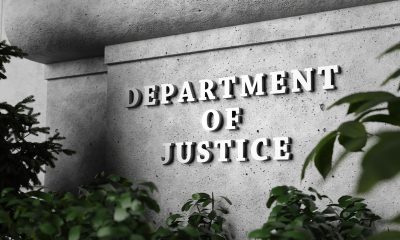National
In Ferguson, the Struggle Continues
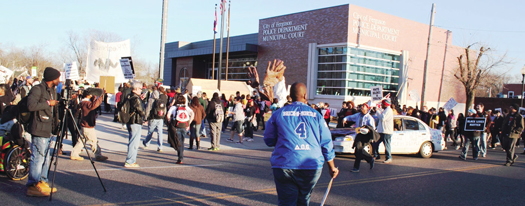 Demonstrators converge on Ferguson Police Dept. headquarters. Demonstrators converge on Ferguson Police Dept. headquarters. |
by J.A. Salaam
Special to the NNPA from The Final Call
FERGUSON, Mo. (FinalCall.com) – Nearly seven months since the death of 18-year-old Michael Brown Jr., the small St. Louis suburb of Ferguson still wrestles with many unanswered questions. Is the movement over? Was the protesting across the country all in vain? What’s on the horizon for the little town of approximately 22,000 residents, 67 percent of whom are Black? And do Black lives really matter?
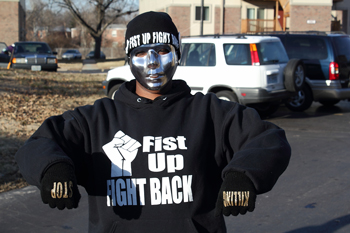 |
What is apparent is emotions and tensions still run high. Recently, over 250 protesters filled a meeting at the aldermanic chamber at St. Louis City Hall to voice concerns on a proposed independent police review board called the Civilian Oversight Board for the city.
The Jan. 28 meeting came to an abrupt close when Jeff Roorda, business manager and spokesperson for the St. Louis City Police union yelled at moderator, Alderman Terry Kennedy for failing to “restore order” when protesters interrupted.
“Can we get some order in here?,” Mr. Roorda yelled at the alderman to which Mr. Kennedy responded, “First off you don’t tell me about my function.”
Mr. Roorda then rushed towards Mr. Kennedy when he encountered Cachet Currie, a Black woman, in the aisle leaving the meeting. Mr. Roorda grabbed and pushed the woman down to get her out the way resulting in a scratch on her forehead. Ms. Currie is reportedly filing charges. Mr. Roorda was observed wearing an “I am Darren Wilson” wrist band to the meeting.
The proposed board would have the authority to investigate allegations of police misconduct, research and assess police policies, operations and procedures.
It would inspect complaints against members of the police department involving excessive use of force, abuse of authority, sexual harassment and assault, discourtesy, racial profiling, or use of offensive language, including, but not limited to, slurs relating to race, ethnicity, religion, gender, sexual orientation, gender identity, immigrant status and disability.
St. Louis tourism is taking a blow as protesters, college students, clergy and legal activists are disrupting events in the St. Louis region. On Jan. 31 about 30 anti-racism activists walked through the St. Louis RV Vacation & Travel Show with “Face Racism” and “Are you comfortable” drawn on their faces. Some of the protesters held signs that read “White Only” and “No Coloreds.”
Pushing and pressing forward
Reports are surfacing that the federal investigation of former Ferguson police officer Darren Wilson will not result in charges he violated Michael Brown Jr.’s civil rights when he shot and killed the teen.
The Justice Department report has not been completed, and Attorney General Eric Holder will make the final decision whether to press federal civil rights charges against Mr. Wilson. But activists won’t quit pressing for change, despite the outcome in Ferguson and other cities. Community groups and individuals are still organizing and demanding accountability from political and law enforcement leadership. Many meetings and forums took place during the weekend of the Dr. Martin Luther King Jr. Holiday.
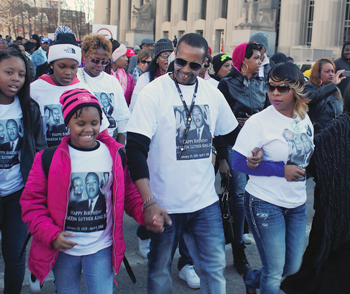
Lesley McSpadden, mother of slain teen Michael Brown, Jr. and her family participate in King holiday march. Photos: D.L. Phillips
|
“The movement is not over, we are not going to settle with the way things have always been. We still have more to do and we didn’t do a good job. Because nothing has changed, we haven’t gotten any of these police officers arrested for misusing their authority; we haven’t gotten any policies changed, the system of preying on poor people are still in effect, police officers are still allowed to do what the hell they want in the community and nothing is done anything yet,” said Dauud Amun Royal, co-chair of the St. Louis-based Center of Hope and Peace.
“So for people to be slapping each other on the back and giving awards as if something meaningful has been done is an insult to the brother who got killed. That’s why we can go on T.V. and jump up and down like we’ve done since the 60s. And it means nothing because we don’t follow through,” continued Mr. Royal who was attending an event honoring Dr. Martin Luther King Jr. There is much more work to do and “we are not finished,” he said.
Participants from across the country gathered for open dialogue with law enforcement representatives, politicians and protestors from various cities. Ferguson 1000 Jobs co-founders St. Louis businessman Dave Spence and economist and investment advisor Dr. Lance McCarthy, Ferguson Police Chief Thomas Jackson, Ferguson Mayor James Knowles III and Paul Muhammad founder of the St. Louis Peace Keepers participated.The Charles Hamilton Houston Institute for Racial Justice hosted an event at Harvard Law School Jan. 17 to discuss racial profiling of Blacks and injustices in the legal system and formulate solutions.
The event was filled with moments of anger and tension toward Ferguson officials.
“I cannot quit or resign as chief in the middle of this, because I must have a chance to fix what’s wrong, that’s my responsibility and no one else can do it but me,” said Chief Jackson to The Final Call when asked about comments during the forum calling for him to resign.
The movement is far from over and diversity training is one of the keys to moving forward but it will be a challenge, Mr. Muhammad told The Final Call. “But if the police departments are willing to allow those of us who are out in the community with the people, we can become the bridge between the police and the community. This would at least start the healing process and build a level of trust between the two,” he added. Police must first engage and get involved in the community and build relationships with the people to serve and protect, said Mr. Muhammad. He also recommended police become more actively engaged in schools, community centers and get to know people on a more human level to develop trust.
On Jan. 18 Missouri Representative William Lacy Clay Jr. and members of the Congressional Black Caucus were at the Wellspring United Methodist Church in Ferguson to speak with the community.
“We need to be outraged when local law enforcement and the justice system repeatedly allow young, unarmed Black men to encounter police and then wind up dead with no consequences,” said Rep. Clay.
Dr. Leah Gunning Francis, an associate dean at the Eden Theological Seminary in St. Louis, insisted that society needed to regard the lives of Black men to be as important as those of White men.
We have to restore the humanity of young Black men, she said.
“We are going nowhere. We have several actions in place to take us from the selfishness thought process and bring it back to the village mindset. We are focusing on awareness, the community, education and the government. We have plans to raise the level of thinking first of the people then we can help sustain the community,” said Jeremy Rhone of the community group Mighty 13 of Ferguson.
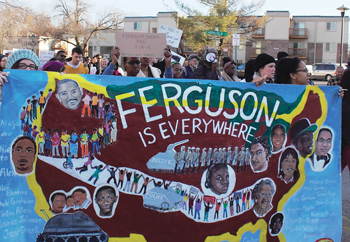
Marchers continue anti-police misconduct marches in Ferguson, Mo.
|
Before the non-indictment of Mr. Wilson many groups had hopes of justice to counteract issues that run deep in the city but the unrest increased locally and nationally, said Mr. Spence. His group, Ferguson 1000 Jobs unveiled a comprehensive plan to address the issues.
“We have been convening meetings with leaders for the last four months and understand there is apathy. People are tired of hearing lip service, hence we developed our views that were delivered as such from a wide variety of leaders in the community,” said Mr. Spence.
Faith-based, corporate, community and youth leaders gave their opinions on what it would take to help get Ferguson back on track. The discussions have resulted in what’s been dubbed “Wish List for Ferguson.” It includes housing development, youth education and scholarships.
Mr. Spence believes the “Wish List” will prompt more dialogue among all St. Louis region stakeholders, leading to action.
Ferguson 1000 Jobs also aims to bring together some of the area’s largest employers to give St. Louis county residents job training, business development, and employment opportunities.
“We are moving towards the poor people’s campaign. You are not going to see us just running out in the street to get tear gassed for freedom. We have to make everyday life a protest. We’ve had demands for six months and not one of our demands were met. None of them!” said youth activist Tory Russell of Hands Up United. He criticized President Barack Obama for not coming to Ferguson like former President Bush went to New Orleans after Hurricane Katrina.
“Here’s the same man that wanted us to vote but he couldn’t come see the people when they were hurting the most. Then the worst was that we thought there was enough to get a civil rights charge. Not just local but nationally, there was cases that were clearly violations but that didn’t matter. That hurts when you have Black officials in high positions of politics but they can’t do nothing for their people,” said Mr. Russell.
“We are begging an uncivil system for civil rights and an inhuman system for human rights and that’s not going to happen. They cannot grant you what you want. They are trying to act like this movement never existed like a 199 cities didn’t rise up.’
“In the 2016 election we will make the question does Black Lives Matter as part of the ballot and they will have to answer that question,” vowed Mr. Russell.
Activism
Oakland Post: Week of December 31, 2025 – January 6, 2026
The printed Weekly Edition of the Oakland Post: Week of – December 31, 2025 – January 6, 2026

To enlarge your view of this issue, use the slider, magnifying glass icon or full page icon in the lower right corner of the browser window.
Activism
2025 in Review: Seven Questions for Assemblymember Lori Wilson — Advocate for Equity, the Environment, and More
Her rise has also included several historic firsts: she is the only Black woman ever appointed to lead the influential Assembly Transportation Committee, and the first freshman legislator elected Chair of the California Legislative Black Caucus. She has also been a vocal advocate for vulnerable communities, becoming the first California legislator to publicly discuss being the parent of a transgender child — an act of visibility that has helped advanced representation at a time when political tensions related to social issues and culture have intensified.

By Edward Henderson, California Black Media
Assemblymember Lori D. Wilson (D-Suisun City) joined the California Legislature in 2022 after making history as Solano County’s first Black female mayor, bringing with her a track record of fiscal discipline, community investment, and inclusive leadership.
She represents the state’s 11th Assembly District, which spans Solano County and portions of Contra Costa and Sacramento Counties.
Her rise has also included several historic firsts: she is the only Black woman ever appointed to lead the influential Assembly Transportation Committee, and the first freshman legislator elected Chair of the California Legislative Black Caucus. She has also been a vocal advocate for vulnerable communities, becoming the first California legislator to publicly discuss being the parent of a transgender child — an act of visibility that has helped advanced representation at a time when political tensions related to social issues and culture have intensified.
California Black Media spoke with Wilson about her successes and disappointments this year and her outlook for 2026.
What stands out as your most important achievement this year?
Getting SB 237 passed in the Assembly. I had the opportunity to co-lead a diverse workgroup of colleagues, spanning a wide range of ideological perspectives on environmental issues.
How did your leadership contribute to improving the lives of Black Californians this year?
The Black Caucus concentrated on the Road to Repair package and prioritized passing a crucial bill that remained incomplete during my time as chair, which establishes a process for identifying descendants of enslaved people for benefit eligibility.
What frustrated you the most this year?
The lack of progress made on getting Prop 4 funds allocated to socially disadvantaged farmers. This delay has real consequences. These farmers have been waiting for essential support that was promised. Watching the process stall, despite the clear need and clear intent of the voters, has been deeply frustrating and reinforces how much work remains to make our systems more responsive and equitable.
What inspired you the most this year?
The resilience of Californians persists despite the unprecedented attacks from the federal government. Watching people stay engaged, hopeful, and determined reminded me why this work matters and why we must continue to protect the rights of every community in our state.
What is one lesson you learned this year that will inform your decision-making next year?
As a legislator, I have the authority to demand answers to my questions — and accept nothing less. That clarity has strengthened my approach to oversight and accountability.
In one word, what is the biggest challenge Black Californians are facing currently?
Affordability and access to quality educational opportunities.
What is the goal you want to achieve most in 2026?
Advance my legislative agenda despite a complex budget environment. The needs across our communities are real, and even in a tight fiscal year, I’m committed to moving forward policies that strengthen safety, expand opportunity, and improve quality of life for the people I represent.
Activism
2025 in Review: Seven Questions for Assemblymember Tina McKinnor, Champion of Reparations, Housing and Workers’ Rights
In 2025, McKinnor pushed forward legislation on renters’ protections, re-entry programs, reparations legislation, and efforts to support Inglewood Unified School District. She spoke with California Black Media about the past year and her work. Here are her responses.

By Joe W. Bowers Jr., California Black Media
Assemblymember Tina McKinnor (D-Inglewood) represents
California’s 61st Assembly District.
As a member of the California Legislative Black Caucus (CLBC),
McKinnor was elected in 2022. She chairs the Los Angeles County Legislative Delegation and leads the Assembly Public Employment and Retirement Committee. McKinnor also served as a civic engagement director, managed political campaigns, and worked as chief of staff for former Assemblymembers Steven Bradford and Autumn Burke.
In 2025, McKinnor pushed forward legislation on renters’ protections, re-entry programs, reparations legislation, and efforts to support Inglewood Unified School District. She spoke with California Black Media about the past year and her work. Here are her responses.
Looking back on 2025, what do you see as your biggest win?
Assembly Bill (AB) 628. If rent is $3,000, people should at least have a stove and a refrigerator. It’s ridiculous that people were renting without basic appliances.
I’m also proud that I was able to secure $8.4 million in the state budget for people coming home from incarceration. That includes the Homecoming Project, the menopause program for incarcerated women, and the Justice Leaders Program.
How did your leadership help make life better for Black Californians this year?
After the Eaton Fire, I pushed to get the same kind of support for affected areas that wealthier regions get after disasters.
I also did a lot of work building political power— establishing the Black Legacy PAC and California for All of Us PAC so we could support Black candidates and educate voters. We also called voters to make sure they understood Prop 50.
People need to understand this: there are only 12 Black legislators in the Capitol. Folks act like we can just walk in and pass reparations, but that’s not how it works.
What frustrated you most this year?
The governor did not have the political will to sign these bills: AB 57 and AB 62. They both passed overwhelmingly in the Assembly and the Senate. We did the work. The only person who didn’t have the political will to sign them was the governor.
The public needs to ask the governor why he didn’t sign the bills. We can’t keep letting people off the hook. He has to answer.
I also introduced AB 51 — the bill to eliminate interest payments on Inglewood Unified School District’s long-standing state loan — held in the Appropriations Committee. That was frustrating,
What inspired you most in 2025?
The civil rights trip to Alabama was life changing. We visited the Legacy Museum and the National Memorial for Peace and Justice. We took members of the Black, Latino, Jewish, and API caucuses with us. It changed all of us.
People aren’t always against us — they just don’t know our history.
What’s one lesson from 2025 that will shape how you approach decisions next year?
The legislative trip to Norway taught me that collaboration matters. Government, labor, and industry sit down together there. They don’t make villains. Everybody doesn’t get everything they want, but they solve problems.
What’s the biggest challenge facing Black Californians in one word?
Inequity. It shows up in housing, wealth, stress – all these things.
What’s the number one goal you want to accomplish in 2026?
Bringing back AB 57 and AB 62, and securing money for the Inglewood Unified loan interest forgiveness.
-

 Bay Area3 weeks ago
Bay Area3 weeks agoPost Salon to Discuss Proposal to Bring Costco to Oakland Community meeting to be held at City Hall, Thursday, Dec. 18
-

 Activism3 weeks ago
Activism3 weeks agoMayor Lee, City Leaders Announce $334 Million Bond Sale for Affordable Housing, Roads, Park Renovations, Libraries and Senior Centers
-

 Activism3 weeks ago
Activism3 weeks agoOakland Post: Week of December 10 – 16, 2025
-

 Activism3 weeks ago
Activism3 weeks agoOakland School Board Grapples with Potential $100 Million Shortfall Next Year
-

 Arts and Culture3 weeks ago
Arts and Culture3 weeks agoFayeth Gardens Holds 3rd Annual Kwanzaa Celebration at Hayward City Hall on Dec. 28
-

 Activism3 weeks ago
Activism3 weeks ago2025 in Review: Seven Questions for Black Women’s Think Tank Founder Kellie Todd Griffin
-

 Advice3 weeks ago
Advice3 weeks agoCOMMENTARY: If You Don’t Want Your ‘Black Card’ Revoked, Watch What You Bring to Holiday Dinners
-

 Activism3 weeks ago
Activism3 weeks agoAnn Lowe: The Quiet Genius of American Couture












